Father of Greatness
The Father of Greatness (Syriac-Aramaic: Abba d'Rabbuta;[4] Chinese: 明尊; pinyin: Míngzūn; Wade–Giles: Ming2-tsun1; Zhuyin Fuhao: ㄇㄧㄥˊ ㄗㄨㄣ; lit.: 'Radiant Lord') is the eternal divine manifestation of good in Manichaeism,[2] and a four-fold deity, embracing divinity, light, power and goodness. His throne is surrounded by at least 156 peaceful entities: 12 aeons, aeons of the aeons and angels.[5][2]
| Father of Greatness | |
|---|---|
God of Light, King of Realm of Light | |
 Father of Greatness sitting on a pedestal in the centre in the Realm of Light. Top section of the Manichaean Diagram of the Universe. | |
| Other names | Zurwān[1] |
| Abode | Realm of Light |
| Symbol | Light |
| Offspring | Jesus the Splendour |
| Equivalents | |
| Zoroastrian equivalent | Zurvan |
| Gnostic equivalent | Monad[2] |
 |
|
|
|
|
|
Influenced by |
When the Prince of Darkness assaulted the realm of light, he invoked entities of light to ward off the invaders. These entities mingled with the demons and gave existence to the earthly beings, thus humans carry consubstantial light particles of the Father of Greatness, but are unaware of them, until they awaken from their sleep by remembering their divine origin. The Father of Greatness responds by creating a series of entities to prepare a rescue for light particles.
Theodicy
Manichaeism rejects everything associated with evil from the Father of Greatness, the Manichaean deity. Neither can he cause suffering nor is he able to charge.[6] He can merely defend. Thus, the power of the Father of Greatness is limited by its own nature. Although he is not all-powerful, in the end time he will have gathered all light particles and evil will be banished into its own kingdom never commingling again.[2] Therefore, Manichaeism also rejects the portrayal of God in the Old Testament, who promises victory over one's enemies (Lev: 26:3-10).[7] Accordingly, the problem of evil can be solved straightforwardly as God is limited in his power against forces beyond the world of light and by his own nature.[8]
References
- Nugteren, Albertina (2019). Religion, Ritual and Ritualistic Objects. Basel: MDPI. p. 132. ISBN 9783038977520.
- Willis Barnstone, Marvin Meyer. The Gnostic Bible: Revised and Expanded Edition, Shambhala Publications, 2009, ISBN 978-0-834-82414-0, pages 4, 595, 827
- Van den Berg, Jacob Albert; Kotzé, Annemaré; Nicklas, Tobias; Scopello, Madeleine, eds. (2010). In Search of Truth: Augustine, Manichaeism and other Gnosticism — Studies for Johannes van Oort at Sixty. "Nag Hammadi and Manichaean Studies" series. 74. Leiden: Brill Publishers. p. 305. ISBN 9789004195790.
- Char Yar. "Zurvan - A Historical Name of God in Manichaeism". academia.edu. Retrieved 2 June 2020.
- H. J. Klimkeit Manichaean Art and Calligraphy 1982 ISBN 9789004064782 p. 9
- Jacob Albert van den Berg, Annemaré Kotzé, Tobias Nicklas, Madeleine Scopello In Search of Truth. Augustine, Manichaeism and other Gnosticism: Studies for Johannes van Oort at Sixty BRILL 2010 ISBN 9789004195790 p. 233
- Jason David BeDuhn Augustine's Manichaean dilemma, Band 2 University of Pennsylvania Press 2010 ISBN 9780812244946 p. 176
- David Vincent Meconi, Eleonore Stump The Cambridge Companion to Augustine Cambridge University Press 2014 ISBN 9781107025332 p.98
.jpg)
